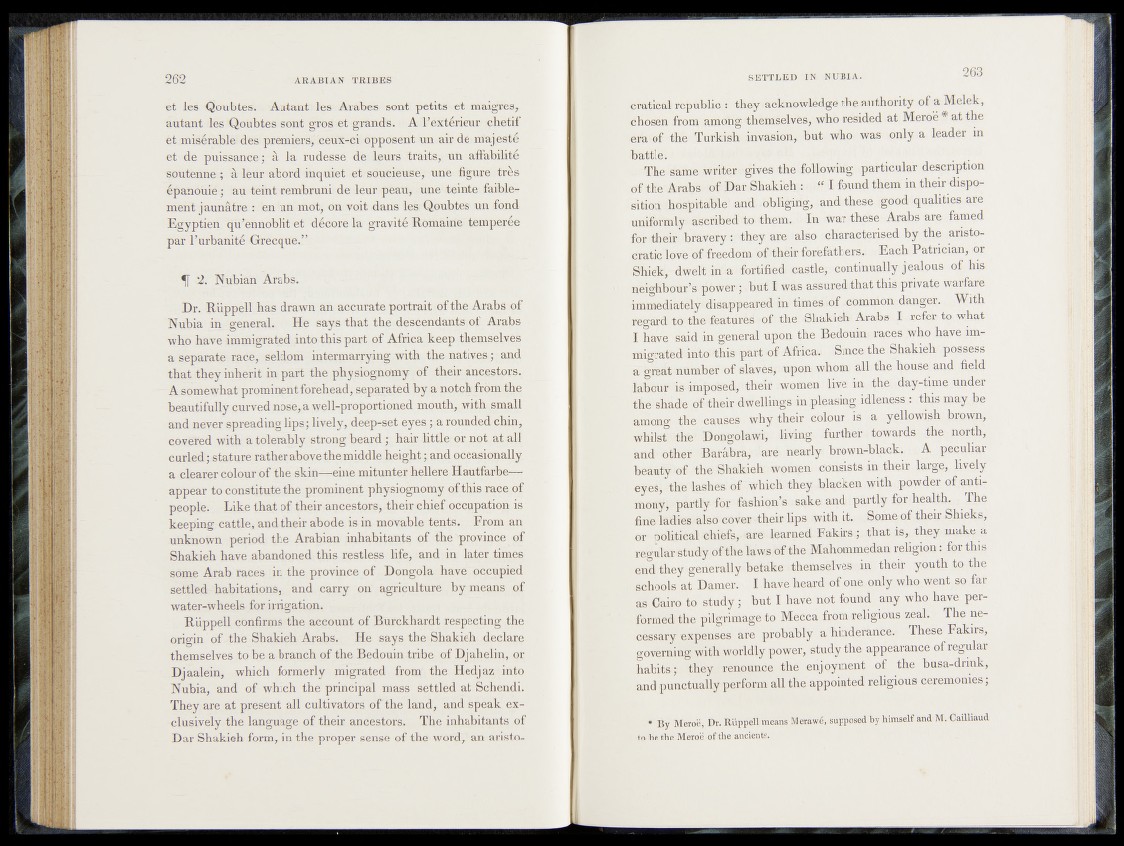
et les Qoubtes. Autant les Arabes sont petits et maigres,
autant les Qoubtes sont gros et grands. A l’extérieur chétif
èt misérables des premierSj'ceux-ci opposent un air de maj esté
et de puissance j à la rudesse de leurs traits,: un affabilité
soutenne ; à leur abord inquiet et soucieuse/ une figure très
épanouie ; au teint rembruni de leur peau, une teinte faiblement
jaunâtre : en un mot, on voit dans les Qoubtes un fond
Egyptien qu’ennoblit et décore la gravité Romaine temperée
par l’urbanité .Grecque»”
*2. Nubian Arabs.
Dr. Rüppell has drawn an accurate portrait of the Arabs of
Nubia in general. He says that the. descendants ?©f Arabs
who have immigrated into this part of Africa keep themselves
a separate race, seldom intermarrying with the natives ; and
that they inherit in part the physiognomy of their ancestor^.
A somewhat prominent forehead, separated by a notçli from the
beautifully curved nose, a well-proportioned mouth, with, small
and never spreading lips ; lively, deép-set eyes,; Ur rounded chin,
covered with a tolerably strong beard ; hair littleyqi, not at all
curled ; stature rather above themiddle height ; and occasionally
a clearer colour of the skin—eine mitunter hellere Hautfarbe—
appear to constitute the prominent physiognomy of this race of
people. Like that of their ancestors* their chief occupation, is
keeping cattle, and their abode is in movable tents. From an
unknown period the Arabian inhabitants of the'province of
Shakieh have abandoned this restless life, and in later times
some Arab races in the province of Dongola have 'occupied
settled habitations, and carry on agriculture by-means of
water-wheels for irrigation.
Rüppell confirms the aceount of Burckhardt respecting the
origin ofrthe Shakieh Arabs. He says the Shakieh declare
themselves to be a branch of the Bedouin tribe of Djahelin, or
Djaalein, which formerly migrated from' the Hedjaz into
Nubia, and of which the principal mass settled at Schendi.
They are at present all cultivators of the land, and speak exclusively
the language of their ancestors. The inhabitants of
Dar Shakieh form, in the proper sense of the word, an aristocratical
republic : they acknowledge the authority of a Melek,
chosen frona ameftig- themselves, who resided at Meroë # at the
era of the Turkish invasion, but who was only a leader in
battle; ’ ■ :; ;‘!i : ■’'" : 8W $ * ■; %
% The same writer gives the .following .particular description
of the-Arabs of Dar Shakieh :>.0‘ I found them in their disposition
hospitable1 and-obliging, mnd these good qualities are
uniformly ascribed" to them., In war these Arabs are famed
for their bravery: they are also characterised by the aristocratic
love of freedom of'thé® forefathers. Each Patrician, or
Shiék; dwelt ;in a fortified castle, continually jealous of his
neighbour’s |k>wer-; but I was assured that thisiprivate warfare
immediately disappeared in times of .common danger. With
regard to the features - of the-'Shakieh Arabs I -,refer to what
I have said in general upon the Bedouin*.races who have immigrated
mto-this part of Africa.! Since the. Shakieh possess
a great-number of slaves, upon whotn all the house; and field
labour is imposed,- their women live in the-day-time under
the-shade efr their dwellings inpleasing. idleness.;, this maybe
among the causes why their colour is a yellowish brown,
whilst -the Dongolawi, living further | towards the north,
and other Batahra, are nearly brown-black. ; A peculiar
beauty of the Shakieh women consists, in. their large, lively
eyes, the lashes of which they blacken with powder of antimony*
partly for fashion’s sake and partly fpr-health. ^ The
fine ladies also cover their lips with it. Some of their Shieks^,
or political chiefs, -are learned Fakirs ; that is, they make a
regular study ofthe laws of the Mahommedan religion: for this
end they generally betake .themselves in their youth to the
schools at Darner. I have heard of one only who went so far
as Cairo to study; but I have not found any who have performed
the pilgrimage to Mecca from religious zeal. The necessary
expenses are probably a hinderance. These Fakirs,
governing with worldly power, study the appearance of regular
habits; they renounce the enjoyment of the busa-drink,
and punctually perform all the appointed religious ceremonies;
• By Meroë, Dr. RiippéE means Merawé, supposed by himself and M. Cailliaud
to be the Meroë of the ancients.